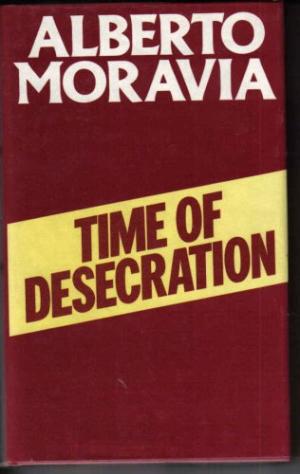Inspiring Older Readers
 posted on 25 Sep 2017
posted on 25 Sep 2017
Time of Desecration by Alberto Moravia
I have half a dozen of Moravia’s novels on my bookshelves but I must confess that it’s been the best part of 30 years since I last read one. I had originally been drawn to him because I knew that the influential new wave Italian film-makers Bertolucci and Di Sica had used his novels as the basis for films and, all those years ago, his reputation as one of the most significant European novelists and the most important Italian writer was still buoyant. Then recently, while I was grazing over some newspaper reviews, I stumbled on one by the Scottish poet and writer who I much admire, John Burnside, entitled My Hero: Alberto Moravia which said:
Moravia is neglected nowadays, which is a great pity, for this rare combination of moral purpose and artistic integrity once placed him among Europe's finest writers. I would argue that it is high time for a reappraisal, as well as a new edition of his work – preferably without naked ladies on the covers.
This sent me back to my shelves to have a look at what I had and I found myself reading his 1980 novel Time of Desecration. Written a decade before his death in 1990, Moravia conceived this book as his last (although that’s not quite what happened) and was deliberately titled to be the counterpart to his breakthrough book published in 1929 Time of Indifference.
Moravia’s themes have changed little over the years with their focus on the destructive and stifling influence of bourgeois values and actions. He directly challenges what he sees as the sterile hypocrisy of the aristocracy and upper middle classes and the often thuggish brutality of aspects of working class culture which he rejects as an alternative to the pervasive sterility of politics and social structures. His preparedness to be absolutely direct and frank on the subject of sex has led him to be sometimes marketed as an ‘erotic’ writer but this is to totally misunderstand the role that sex plays in Moravia’s deconstruction of social mores. It is also, incidentally, the reason why John Burnside wants to see his books reprinted without naked women on the cover – anyone buying these books in the hope of sexual thrills is going to be sorely disappointed.
Time of Desecration seeks to take these themes to their ultimate conclusion and the result is a book that is overpoweringly claustrophobic and with an atmosphere that is both heady and rank. Desideria is the adopted, overweight daughter of Viola, a rich but sexually and morally dissolute member of the Roman upper classes and it is Desideria who will be the storyteller throughout the book. Controversially, Moravia sets the narrative up in the form of an interview between Desideria and the unspecified ‘I’ – who could be the novelist or could be the reader. It’s a technique that gets in the way at first but is something that slips into the background as you get accustomed to reading it.
Desideria, like Joan of Arc, starts to hear an internal ‘Voice’ that takes control of her actions and her personality – but unlike Joan’s, this voice urges the deliberate destruction and perversion of all bourgeois values (what it calls ‘transgression and desecration’). Losing weight and becoming a beautiful and desirable teenager, Desideria finds herself the object of lust for her adoptive mother and her conservative lover and this is something The Voice encourages because it will further the aim of exposing the so-called ‘family values’ on which bourgeois society is built. She becomes enchanted by the idea of revolution but not just a narrow political revolution but something that will sweep away the hypocrisy of the existing social order. All the time her Voice is forcing her to take actions and say things that push her to confront her own and other people’s perception of what is accepted behaviour. If the upper classes are so morally corrupt that they are hard to shock then it’s necessary to go even further to desecrate their values.
Her association with prostitutes, madams, middle class gigolos masquerading as revolutionaries and working class revolutionaries steeped in sexist assumptions take her on an odd sort of picaresque journey – a kind of existentialist, even nihilistic, trip that we know can only end one way. And it does, with two murders.
I said at the beginning of this review that this is a claustrophobic experience and going in and coming out of the book is like entering and leaving a room with a thick and tangible atmosphere. Moravia is often praised for his masterly prose but I have to admit that I found it somewhat stilted and stiff – although I’ve no idea how much of that might be down to the translation. The book is, in my view, at least a hundred pages too long and possibly more (did this really need 400 pages?) and the way sex came to increasingly dominate the narrative felt like it was being used as a bludgeon rather than a scalpel.
Moravia is, if nothing else, a novelist of ideas rather than of action and this book shows that he remained fearless in going into places that others might find uncomfortable. My feelings are, however, that his earlier works from the 1940s and 1950s do the job in a more economical and unambiguous way and it’s maybe those I’d return to if and when Moravia pops onto my radar again.
Terry Potter
September 2017